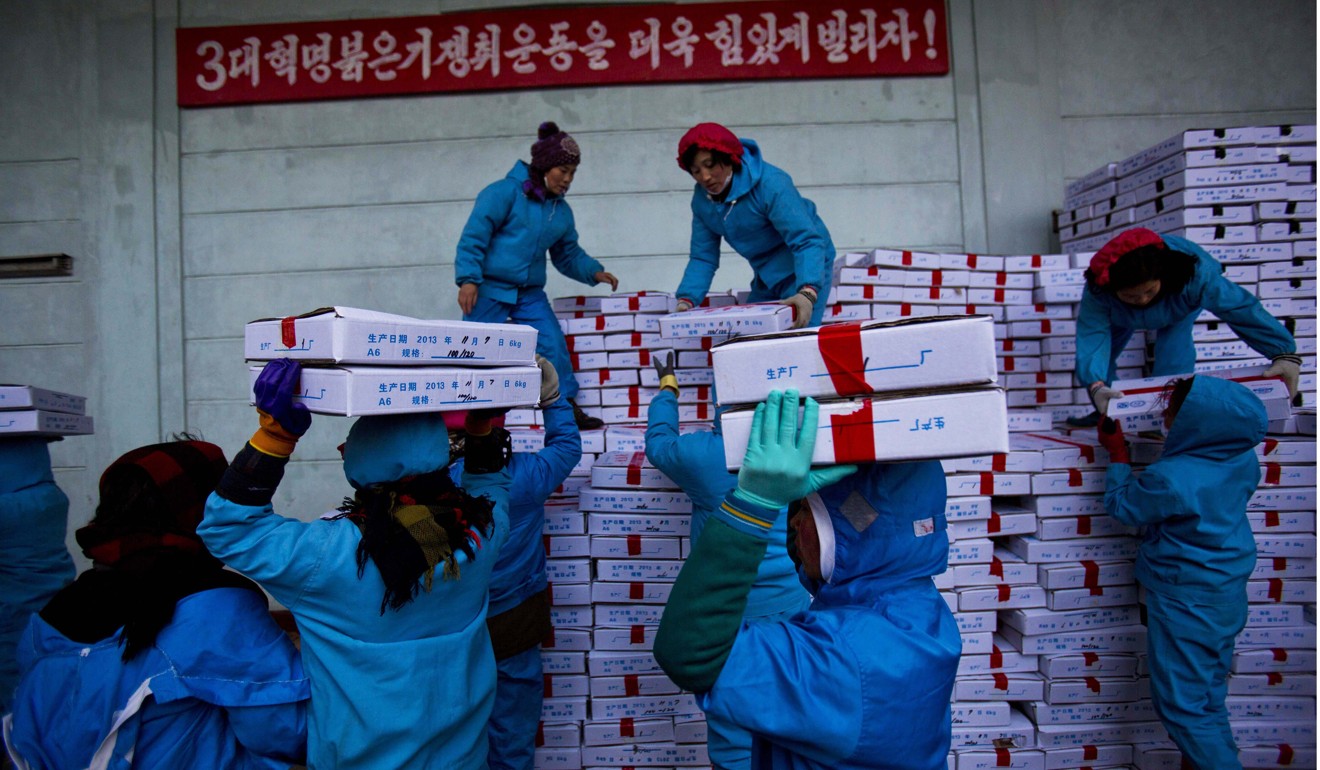
North Korean trade with biggest partner China dives 48 per cent amid sanctions
- Reliance on communist neighbour takes overall foreign trade volume below US$3 billion for first time since Kim Jong-un took power, according to report
- Observers say slow economic growth could weaken regime in the long run, but Beijing is expected to keep UN measures in place for now
North Korea’s trade with China has again fallen sharply, taking the country’s overall foreign trade volume below US$3 billion for the first time since Kim Jong-un took power in 2011.
Trade with China totalled US$2.7 billion in 2018, down 48.2 per cent from a year earlier, according to a report from the Korea Trade-Investment Promotion Agency on Friday.
But according to the report, “North Korea’s Foreign Trade Trend in 2018”, the country’s trade reliance on its communist neighbour reached a record high last year.
That heavy reliance on China meant North Korea’s overall foreign trade, excluding inter-Korean trade, also shrank, for a second consecutive year. It was down by 48.8 per cent from 2017 to US$2.84 billion.
Russia, the country’s second biggest trading partner, accounts for just 1.2 per cent of North Korea’s total trade volume.
Exports from the hermit kingdom plunged by 86 per cent to US$243 million last year, while imports fell 31 per cent to US$2.6 billion, according to the report.
Beijing backed the United Nations’ sanctions regime in 2017 and has said it would continue to do so as part of efforts to halt Pyongyang’s nuclear ambitions.
One UN Security Council resolution requires all North Koreans working overseas to return to the country by the end of this year, to prevent Pyongyang from using the money it takes from them to fund its nuclear weapons programme.
Under other UN sanctions, imports from North Korea including seafood, iron and iron ore have been banned in a bid to cut its export income.

Kim has vowed to improve the economy since he took over as leader of North Korea after his father’s death, a task made more difficult with no sanctions relief in sight.
In April last year, he announced that Pyongyang was moving away from its twin-track byungjin policy of developing nuclear weapons and the economy simultaneously. Instead, the focus would be on rebuilding the economy, tying the future of his administration to economic growth.
China likely to tread carefully on North Korea as power dynamic shifts
Observers said slow growth could weaken the Kim regime in the long run.
James Downes, a lecturer in comparative politics and global studies at Chinese University of Hong Kong, said if the economic relationship with China continued to diminish, “this could cause uncertainty amongst Kim’s inner circles, such as the military and economic elites – the donju [money masters] – in North Korea”.
“In effect, this could serve to weaken Kim’s legitimacy, not in the short term, but in the longer term, if current economic projection forecasts continue. Diminishing trade between both countries would, therefore, be highly damaging and unstable for the Kim regime,” Downes said.
China was also expected to keep sanctions on the North in place for now, because Beijing needed to consider its bilateral relations with Pyongyang in a bigger context.
“China’s declining trade with North Korea is likely to be a consequence of multiple factors, ranging from China’s economic slowdown to the US-China trade war and the political uncertainty surrounding Kim Jong-un, and his relationship with President [Donald] Trump and the United States,” Downes said.
Zhang Baohui, director of the Centre for Asian Pacific Studies at Lingnan University in Hong Kong, said the countries’ declining trade “only means that China is doing its work under the UN sanctions regime”.
“These numbers suggest that China has been diligent with its responsibilities to the international community,” Zhang said. “The decline should not be a surprise, as the sanctions have sharply curtailed exports from North Korea, including iron ore, seafood and textiles.”

